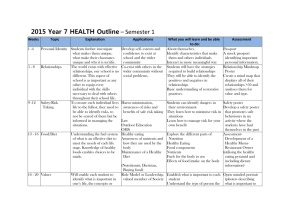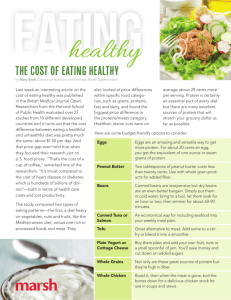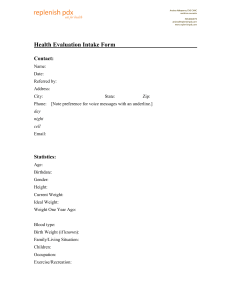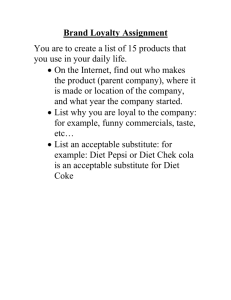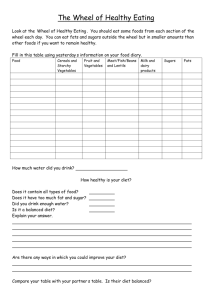Expectations of mealtimes for young people on the eating disorder
advertisement
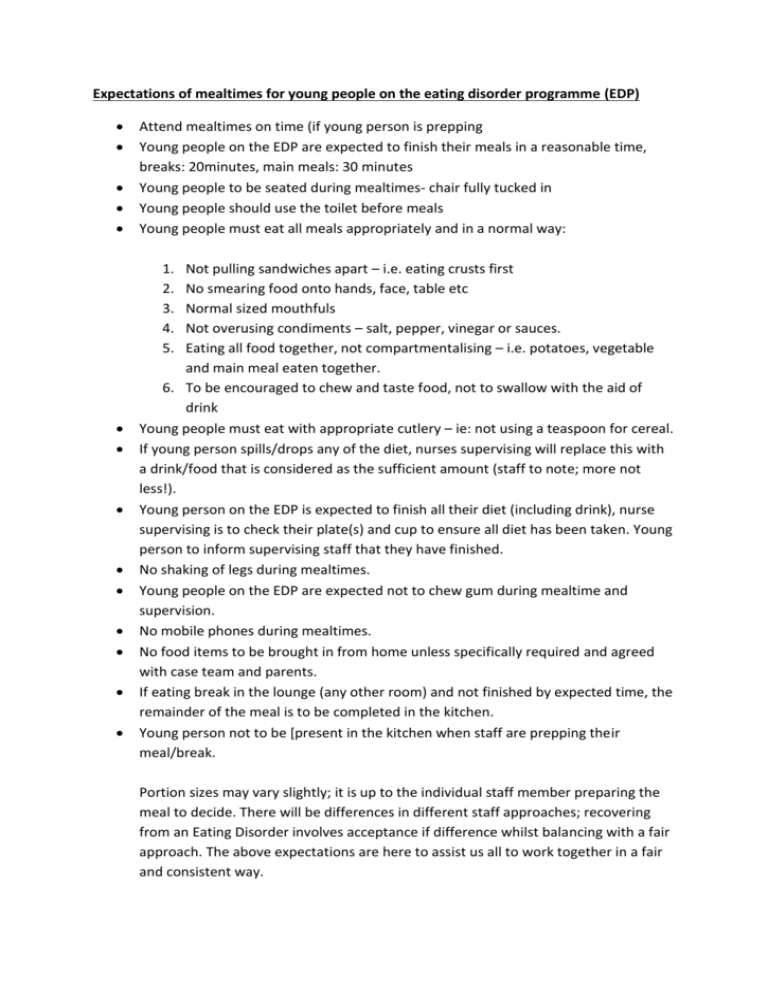
Expectations of mealtimes for young people on the eating disorder programme (EDP) Attend mealtimes on time (if young person is prepping Young people on the EDP are expected to finish their meals in a reasonable time, breaks: 20minutes, main meals: 30 minutes Young people to be seated during mealtimes- chair fully tucked in Young people should use the toilet before meals Young people must eat all meals appropriately and in a normal way: 1. 2. 3. 4. 5. Not pulling sandwiches apart – i.e. eating crusts first No smearing food onto hands, face, table etc Normal sized mouthfuls Not overusing condiments – salt, pepper, vinegar or sauces. Eating all food together, not compartmentalising – i.e. potatoes, vegetable and main meal eaten together. 6. To be encouraged to chew and taste food, not to swallow with the aid of drink Young people must eat with appropriate cutlery – ie: not using a teaspoon for cereal. If young person spills/drops any of the diet, nurses supervising will replace this with a drink/food that is considered as the sufficient amount (staff to note; more not less!). Young person on the EDP is expected to finish all their diet (including drink), nurse supervising is to check their plate(s) and cup to ensure all diet has been taken. Young person to inform supervising staff that they have finished. No shaking of legs during mealtimes. Young people on the EDP are expected not to chew gum during mealtime and supervision. No mobile phones during mealtimes. No food items to be brought in from home unless specifically required and agreed with case team and parents. If eating break in the lounge (any other room) and not finished by expected time, the remainder of the meal is to be completed in the kitchen. Young person not to be [present in the kitchen when staff are prepping their meal/break. Portion sizes may vary slightly; it is up to the individual staff member preparing the meal to decide. There will be differences in different staff approaches; recovering from an Eating Disorder involves acceptance if difference whilst balancing with a fair approach. The above expectations are here to assist us all to work together in a fair and consistent way. Rationale of expectations - To promote ‘normal’ eating behaviours. To encourage and build healthy attitudes towards food. Why do we....... - Q. Ensure all diet is taken and check plate/cup (discourage smearing)? A. Stage 1 of the EDP is re-feeding, it is therefore important to ensure that young person is taking in all their expected diet so that weight increases. Additionally, if young people can see they can miss parts of their diet – what does that reinforce? - Q. Monitor the use of condiments? A. Sometimes, young people may overuse the amount of condiments, it is not a ‘normal’ eating behaviour and it is possible that the young person is either disguising the taste of their food or perhaps spoiling it so that they do not enjoy it. - Q. Encourage normal sized mouthfuls? A. Initially a young person may struggle with this as they may have starved themselves prior to admission, and so they may feel full after a little amount of food, as time goes on the young person should be able to take in more diet and this will subside. It may be that some young people eat slowly/take very small mouthfuls to postpone the actual act of swallowing the food, or perhaps to count mouthfuls i.e. work out calorie intake. Additionally, slowness may be related to increased staff input, it is a very visible way of letting staff know that they are struggling. - Q. Ask the young people not to chew gum? A. Some people on the EDP may chew gum as a means to rid the taste of food after a mealtime, we need to promote a healthy attitude towards food and likewise encourage young people to enjoy their meals. Additionally, it may also be an attempt to rid calories, quicken digestion and increase the feeling of fullness. - Q. Replace diet/drink that has been spilt of dropped? A. To ensure all diet is taken, it is about emphasising the importance of diet in one’s daily living; additionally it encourages that young person to get into the routine of not skipping/missing parts of their diet and not feeling a sense of achievement in being able to do this. We do not want to reinforce that missing of diet is acceptable / or ignored – there is a consequence. - Q. Encourages parts of meal to be eaten together? A. Young people may have ritualistic behaviours when eating – i.e: eating certain foods first, leaving the ‘fatty’ part till last etc.... we need to encourage ‘normal’ eating behaviours and promote that healthy attitude towards food. - Q. Give feedback around excessive leg shaking? A. Young people may see this as another form of exercise, they may see it as a way to burn off the calories they are eating/have eaten. It is not a ‘normal’ behaviour and feedback must be given. Again this is a visible sign that the young person is struggling, staff are to note/reflect upon this. Staff are to normalise activity, i.e. decrease leg shaking = game of Poole. - Q. Ask young people to use appropriate cutlery? A. To encourage ‘normal’ eating behaviours, rather than reinforce ritualistic behaviour in relation to meal (e.g. to have same plate/cutlery). - Q. Ask that young people use the toilet before mealtimes (and supervision)? A. This may serve as an opportunity for that young person to either secrete foods or engage in purging behaviours.

